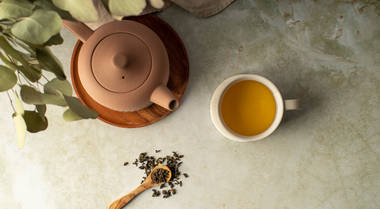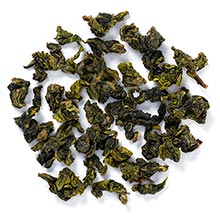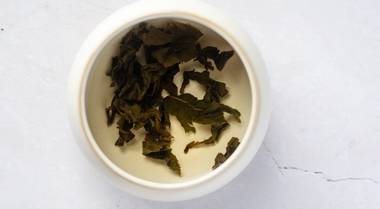All About Ti Kuan Yin Oolong Tea (aka Ti Kwan Yin, Ti Guan Yin)
by Abby Morrison
April 16, 2024

What is it?
Ti Kuan Yin is an oolong tea originating from the Fujian province of China. The finer varieties are among some of the most expensive in the world, and with not one but two legends explaining its creation, its easy to see why.The first legend, known as the Wei legend, revolves around a poor farmer named Wei. Noticing the disrepair of a local temple dedicated to Guanyin, the Bodhisattva of Compassion, and lacking the funds for repairs, he devoted himself to sweeping the temple and offering incense twice a month. As a reward for his reverence, Guanyin appeared to him in a dream, revealing the location of a treasure in a nearby cave. The treasure turned out to be a tea shoot, which Wei nurtured and shared with his neighbors, leading to the creation of the tea. To honor their benefactor, Wei and his neighbors named the tea Tieguanyin, which means "Iron Bodhisattva of Compassion."

The second legend, known as the Wang legend, revolves around a scholar rather than a farmer. According to this legend, the scholar Wang discovered the tea plant under a rock in Xiping. After cultivating the plant, he presented it to the emperor as a gift from his village. The name in this legend derives not from a Bodhisattva but from the location where it was found, under Guanyin rock.
Regardless of how the tea was discovered and initially cultivated, it is clear that great care has been taken in its cultivation ever since. The preparation process involves at least a dozen steps, from plucking the leaves to withering, cooling, tossing, rolling, and more, with some varieties also undergoing additional steps such as roasting or scenting. Additionally, there are multiple varieties of the tea which can be categorized by roasting level, harvest time, and location.
The result is a beautiful semi-rolled leaf, varying from pale to deep green in color and in complexity, floral notes, and final tea color based on its preparation. Paler, lighter teas undergo less oxidation, while darker, more complex teas come from leaves that have been roasted.
At Adagio, we offer two varieties of Ti Kuan Yin. Our first, known as Oolong Goddess, is sourced directly from our farmer contact in China, Wang Mei Rui, who has been growing tea for more than thirty years. We also offer our Fujian Ti Kuan Yin, which has a more buttery texture with a note of honeydew as the tea cools.

Preparation and Taste
To best prepare Ti Kuan Yin, use one heaping teaspoon per cup and steep at 195 for 23 minutes. Given that the leaves are slightly rolled, using a larger infuser, bag, or teapot where the tea leaves can unfurl is optimal. Ti Kuan Yin is also extremely well-suited to multiple steeps, with three or four possible when prepared at the 23 minute mark or even more using the Gong Fu steeping technique at shorter durations.
In terms of flavor and aroma, Ti Kuan Yin has a delicate grassy, floral smell and a surprisingly light, floral flavor for an oolong. Although there is a mineral edge, it lacks the heavier earthy notes typically expected from an oolong, leaning closer to a green tea in flavor, though it is worth noting that the flavor will grow and change with additional steeps, gaining in strength and complexity.
Given the lightness and complexity of the flavor, it is recommended to enjoy this tea without any additions like milk, sugar, or other sweeteners.
Flavor Pairings
As this tea is an oolong, leaning closer to the green than the black side of the tea spectrum, it pairs better with lighter meats such as chicken or pork than with red meats. However, given the evolving flavor and the enjoyment that can be derived from multiple steeps, it is perhaps best to enjoy this tea on its own, savoring the deepening, changing flavors as they develop. Alone, it may be the perfect way to round out a heavy meal to ease digestion or to fill the snacking hours of a long, lazy afternoon spent reading.Similar Teas
Ti Kuan Yin offers a range of flavors and varieties across its steepings that, in some cases, it might best compare to itself at different steeping stages.Other Ti Kuan Yins to try from Masters include:
Traditional Ti Kuan Yin
Jin Guan Yin
Tie Kuan Yin Black
If youre looking to dive deeper into teas like this, we have many options for you to try. First, of course, you can try both varieties of Ti Kuan Yin to find your favorite. We also have our Oolong Teas of China Gift Sampler, which features three other teas besides this one, including Dancong Aria, Formosa Bai Hao, and Wuyi Ensemble.
And if you like those pretty rolled leaves and want something a little sweet and grassy, Ali Shan will be your perfect fit.
We hope youve enjoyed this deep dive on Ti Kuan Yin. If you try it and find youve discovered a new treasure of your own, please let us know on social @AdagioTeas.